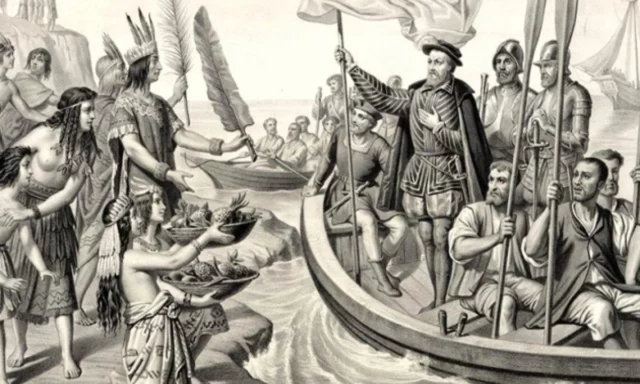With the aim of extolling the multicultural and multiethnic character of the Costa Rican people, every October 12th, the “Día de las Culturas”(Day of Cultures) is commemorated in Costa Rica, from the signing of Law No. 7426, of August 23, 1994.
The Ministry of Culture and Youth (MCJ), commemorates this date with cultural activities framed in this event, in order to remember its importance for Costa Rican society.
“For the Ministry of Culture and Youth, it is transcendental to commemorate this date that meant a before and after for the inhabitants of America, as well as for our ancestors. The current generations must know the history and how our society came to be what it is today. And the most important and fundamental thing is to create awareness in our children and youth of how historical events have built the society that we are now”, said Dennis Portuguez, minister a.i. of the Ministry of Culture and Youth.
In this sense, the MCJ Communications Unit interviewed two historians to find out the importance that the Day of Cultures has for Costa Ricans, how it has evolved over time and the reason why it ceased to be a holiday.
Importance of remembering October 12th in Costa Rican society
According to Dr. Elizeth Payne Iglesias, from the CIHAC School of History-University of Costa Rica, the importance of remembering this date lies in the fact that “it is a tool to form the memory of important processes and events for national history. October 12th is a key date because it commemorates the arrival of the Spanish (conquest and colonization) in America and its consequences or effects. These were economic, social, political, religious and sociocultural.
In addition, it has significance due to its effects. These were, from the level of the conquest and subjugation of the majority of the indigenous population, for the purpose of using their labor; first, as slaves and, later, through many forms of exploitation, such as the “encomienda” and the “repartimiento”, other effects were diseases such as smallpox, measles, typhus and yellow fever. It is estimated that between 80 and 90% of the original population died in the course of the mid-16th century to the mid-17th century,” Payne explained.

From “Día de la Raza” to “Día de las Culturas”
“Before, in Costa Rica, October 12th was called the ‘Día de la Raza’; Currently, after a change in national legislation, it is called ‘Day of Cultures’, the result of a profound struggle by an important sector of the citizenry, aware of the vital importance of memory in the construction and preservation of national identity.
In relation to the change of name that this event underwent, Payne commented: “In 1992, a group of academics from the University of Costa Rica (among them María Eugenia Bozolli, Eugenia Ibarra, Omar Hernández and Juan Rafael Quesada), proposed a change name, which was accepted and was renamed ‘Day of Cultures’. The objective of the change for ‘Day of Cultures’ was to include all the populations that inhabit the national territory, be they indigenous, Afro-descendant, Oriental, among others.
For her part, the historian Matilde Amaya Cerdas Alvarado, stated that the reason why this day ceased to be a day off was for purely political reasons. “I think this was a political decision, since this holiday was eliminated to include December 1st as the Day of the Abolition of the Army,” she said.
Not erasing history
Along these same lines, Cerdas pointed out, “I consider that removing a date from the calendar of school celebrations does not erase History. The History of the discovery, conquest and colonization of America responds to the mentality of an era. It is the moment of national and absolutist states in Europe (England, France, Spain, Portugal), and of the mercantilist economy. In the case of Spain, we must remember that those kingdoms, which later formed what we know today as Spain, were emerging from eight centuries of Muslim domination and hence the way of approaching the ‘conversion of the infidel indigenous people’. In short, to that spirit of evangelizing crusade that wanted to give the crown of Castile to the conquest, is added a passionate desire for riches, thirst for gold and the mistreatment of the inhabitants of these lands who were stripped of their lands, of their rights and freedoms”.
It is from these arguments that lies the importance of remembering this date, in which the fusion of cultures that make up Costa Rican society and the wealth that they all contribute to the development of the country’s culture is made manifest.

